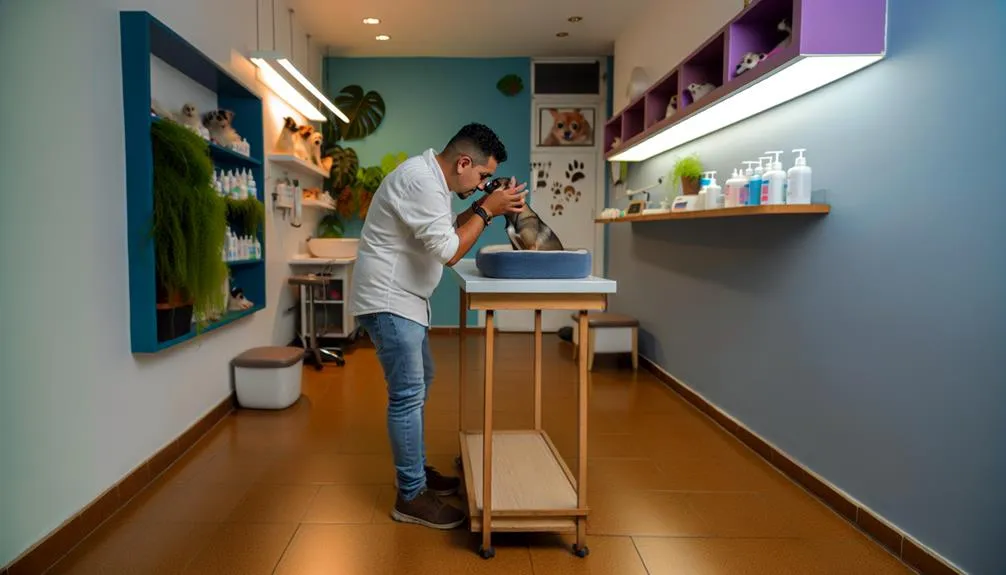
Is There a Natural Way to Treat Dog Cataracts Naturally
When you notice signs of cataracts in your dog, it's natural to wonder if there are effective, natural treatments available. You might be surprised to learn that certain dietary adjustments, supplements, and even herbal remedies could play a role in managing this condition. While conventional treatments often come to mind, exploring holistic approaches can offer a different perspective on eye health. But what specific changes can you implement to support your dog's vision? The answers might be more accessible than you think.
Understanding Dog Cataracts
Dog cataracts are a common ocular condition that can greatly impact your pet's vision. They occur when the lens of the eye becomes cloudy, hindering the passage of light and ultimately impairing sight. Understanding the cataract causes is vital for you as a pet owner. Factors such as genetics, aging, diabetes, and certain medications can contribute to the development of cataracts in dogs.
When it comes to symptoms assessment, you should be vigilant for signs that may indicate your dog is experiencing cataracts. Common symptoms include cloudy or white spots in the eyes, changes in behavior such as reluctance to jump or navigate familiar environments, and difficulty seeing in low light. If you notice any of these indicators, it's important to consult your veterinarian for a thorough examination.
Your vet will likely perform a detailed eye examination to assess the extent of the cataracts and their impact on your dog's overall eye health. They may utilize specialized equipment to evaluate the lens and surrounding structures. Early detection and Treatment options can greatly improve your dog's quality of life.
Dietary Changes for Eye Health
Maintaining ideal eye health in your pet can greatly influence the progression of cataracts. One effective way to support your dog's vision is through dietary changes. A well-balanced diet rich in specific nutrients can enhance eye health and potentially slow down cataract development.
Incorporating foods high in antioxidants is vital for protecting your dog's eyes. For instance, carrots are packed with beta-carotene, which converts to vitamin A, a nutrient essential for maintaining good vision. The carrot benefits extend beyond just vitamin A; they also contain lutein, which may help filter harmful blue light, reducing the risk of cataracts.
Additionally, blueberries are a powerhouse of antioxidants. Blueberry power lies in their ability to combat oxidative stress, a significant contributor to eye disorders. These small berries are rich in vitamins C and E, both of which support overall eye health and may help prevent the formation of cataracts.
To optimize your dog's diet for eye health, consider the following:
- Include fresh, raw carrots as a crunchy treat or blended into meals.
- Add a handful of blueberries to your dog's kibble or homemade food.
- Guarantee a balanced diet that includes omega-3 fatty acids, found in fish and flaxseed, for anti-inflammatory benefits.
Supplements for Vision Support

When considering supplements for your dog's vision support, it's vital to focus on key nutrients that promote eye health. Herbal remedies can also play a beneficial role, while antioxidants are essential for combating oxidative stress. Understanding these elements can greatly enhance your dog's overall eye condition and potentially slow the progression of cataracts.
Key Nutrients for Vision
Often overlooked, key nutrients play an essential role in supporting your dog's vision health. Making sure your furry friend receives the right vitamins and minerals can greatly contribute to ideal eye function and prevent issues like cataracts. Focus on enhancing your dog's diet with vision-enhancing foods that promote nutrient absorption and overall eye health.
Here are three important nutrients to take into account:
- Vitamin A: Critical for maintaining good vision and preventing night blindness.
- Lutein: A powerful antioxidant that filters harmful light and protects retinal cells.
- Omega-3 Fatty Acids: Supports retinal health and may reduce inflammation.
Incorporating these nutrients into your dog's diet can be achieved through high-quality commercial dog foods or supplements formulated specifically for vision support. Be mindful of your dog's individual dietary needs and consult your veterinarian to ensure the appropriate balance of nutrients. By prioritizing these key nutrients, you can help safeguard your dog's vision and promote long-term eye health, potentially reducing the risk of cataracts and other related conditions.
Herbal Remedies to Consider
Several herbal remedies can provide valuable support for your dog's vision health, particularly when addressing conditions like cataracts. These herbal options often contain natural extracts with properties that may help reduce inflammation and promote overall eye health.
One popular option is bilberry, known for its high levels of antioxidants and potential to improve night vision. Its active compounds may enhance blood circulation to the eyes, helping to maintain ocular health. Another beneficial herbal extract is ginkgo biloba, which is thought to improve blood flow and may support the retina's health.
Turmeric, with its active ingredient curcumin, offers anti-inflammatory benefits and may protect against oxidative stress in the eyes. Additionally, milk thistle can provide liver support, which is essential, as a healthy liver helps eliminate toxins that could impact vision.
When considering these herbal remedies, always consult your veterinarian to determine the appropriate dosages and guarantee compatibility with your dog's overall health plan. Incorporating these natural extracts into your dog's diet may help promote better vision and support eye health as they age.
Importance of Antioxidants
Recognizing the essential role antioxidants play in supporting your dog's vision can lead to better eye health, especially in cases of cataracts. Antioxidants help neutralize free radicals, which can damage cells in your dog's eyes. By incorporating antioxidant-rich foods and supplements, you can potentially slow down the progression of cataracts and promote overall eye health.
Consider these key antioxidant sources:
- Blueberries: Packed with vitamins and phytonutrients, these fruits are known for their powerful antioxidant properties.
- Spinach: This leafy green is rich in lutein and zeaxanthin, which specifically support eye health by filtering harmful light.
- Carrots: High in beta-carotene, carrots not only benefit vision but also provide essential nutrients that promote healthy eyes.
Feeding your dog a balanced diet that includes these antioxidant sources can greatly enhance their eye health. Additionally, consult your veterinarian about appropriate antioxidant supplements tailored to your dog's specific needs. By prioritizing antioxidants, you're actively taking steps to support your dog's vision and maintain their quality of life.
Herbal Remedies to Consider
Herbal remedies can be a valuable adjunct in managing dog cataracts, offering potential benefits without the side effects of conventional medications. Many dog owners are turning to natural solutions, such as herbal infusions and plant extracts, to support their pet's eye health. These remedies may help reduce oxidative stress and improve overall vision.
When considering herbal options, it's important to select those with antioxidant properties. Below is a table summarizing three herbal remedies that you might find beneficial for your dog's cataracts:
| Herbal Remedy | Potential Benefits | Preparation Method |
|---|---|---|
| Bilberry Extract | Rich in antioxidants, may improve vision | Use as a liquid extract or powder in food |
| Ginkgo Biloba | May enhance blood circulation to the eyes | Herbal infusion or capsules |
| Eyebright | Traditionally used for eye health | Prepare as a tea or infusion |
These herbal infusions and plant extracts can be integrated into your dog's diet, but it's essential to consult with a veterinarian before starting any new treatment. Not all herbs are safe for every dog, and your vet can provide guidance tailored to your pet's specific health needs. By incorporating these remedies into a thorough care plan, you may help support your dog's vision health naturally. Remember, while herbal treatments can be beneficial, they should complement, not replace, veterinary care.
Importance of Regular Vet Check-ups

How often do you take your dog to the vet for a check-up? Regular vet visits are essential for your dog's health, particularly when it comes to conditions like cataracts. These check-ups not only guarantee preventive care but also facilitate early detection of any potential health issues, including eye problems that could lead to cataracts.
Consider the following benefits of consistent vet visits:
- Comprehensive Health Assessments: Regular exams allow the vet to evaluate your dog's overall health, checking important signs, weight, and dental health.
- Vaccination Updates: Keeping your dog's vaccinations current is imperative to prevent serious diseases that can compromise their immune system.
- Tailored Health Plans: Your vet can create a personalized health plan based on your dog's age, breed, and lifestyle, making sure they receive the best preventive care.
Lifestyle Modifications for Dogs
To effectively manage your dog's cataracts, consider implementing lifestyle modifications that focus on diet and exercise. A balanced nutritional plan can support eye health, while a regular exercise routine promotes overall well-being. These changes can considerably enhance your dog's quality of life and potentially slow the progression of cataracts.
Diet and Nutrition
Incorporating a balanced diet can greatly influence your dog's eye health, particularly if cataracts are a concern. A holistic approach to nutrition focuses on providing your dog with natural ingredients that support overall wellness, including eye health.
Consider the following dietary components:
- Antioxidant-rich foods: Ingredients like blueberries, spinach, and carrots can help combat oxidative stress, which is linked to cataract formation.
- Omega-3 fatty acids: Fish oil or flaxseed can reduce inflammation and promote better eye health, potentially slowing the progression of cataracts.
- Vitamins and minerals: Confirm your dog receives adequate vitamin C, E, and zinc, as these nutrients are essential for maintaining healthy vision.
Regular Exercise Routine
A balanced diet alone isn't enough to safeguard your dog's eye health; a regular exercise routine plays a significant role too. Engaging in consistent physical activity can enhance your dog's overall well-being, including eye health. Canine fitness is essential, as it promotes proper blood circulation, which is important for delivering critical nutrients to the eyes and flushing out harmful toxins.
Incorporating outdoor activities into your dog's daily regimen not only keeps them physically fit but also stimulates mental health. Activities like walking, running, or playing fetch can help maintain a healthy weight, reducing the risk of diabetes and other conditions that may exacerbate cataracts. Regular exercise can also improve joint mobility, which is important for older dogs who may be more susceptible to vision issues.
Aim for at least 30 minutes of moderate exercise each day, adjusting the intensity based on your dog's age and breed. Mixing up the types of activities can keep your dog engaged and excited about exercise. Remember, a well-exercised dog is likely to be happier and healthier, ultimately contributing to better eye health and potentially reducing the progression of cataracts.
Success Stories and Testimonials

Many pet owners have turned to natural methods to manage their dogs' cataracts, and the success stories are compelling. These personal experiences often highlight the positive changes seen in their pets after incorporating natural treatments. Community feedback indicates a growing trend toward holistic approaches, emphasizing the potential effectiveness of these methods.
Here are a few significant success stories:
- Improved Vision: Many owners report that their dogs showed significant improvement in vision after using supplements rich in antioxidants and omega fatty acids.
- Increased Energy: Several testimonials mention enhanced energy levels and overall liveliness, suggesting that dietary changes and natural supplements can contribute to a dog's well-being.
- Reduced Symptoms: Owners frequently share that their dogs experienced fewer symptoms associated with cataracts, such as cloudiness and discomfort, after implementing natural remedies.
These accounts reflect a shift in how pet owners approach cataract treatment, favoring methods that align with their values of health and well-being. While results can vary, the positive feedback from the community serves as a motivating factor for those exploring natural alternatives. It's essential to consult with a veterinarian before starting any new treatment regimen to guarantee it complements your dog's overall health plan. Ultimately, the stories from fellow pet owners can provide hope and insights as you navigate your dog's cataract journey.
Frequently Asked Questions
Can Cataracts in Dogs Be Hereditary?
Yes, cataracts in dogs can be hereditary. Certain breeds have a genetic predisposition due to hereditary factors that increase their risk of developing cataracts, often leading to early onset or progressive forms of the condition.
Are Certain Breeds More Prone to Cataracts?
Certain breeds exhibit heightened susceptibility to cataracts, including Bulldogs and Cocker Spaniels. Understanding breed susceptibility can aid in cataract prevention, allowing you to take proactive measures like regular eye check-ups and appropriate nutrition for your dog.
How Long Does Cataract Treatment Typically Take?
Cataract care can take considerable time, often weeks to months. You'll want to explore natural remedies and dietary supplements to support healing, but don't expect immediate results; patience is pivotal for progress in treatment.
What Are the Signs of Worsening Cataracts?
When cataract symptoms worsen, you might notice significant vision changes like difficulty seeing at night, increased light sensitivity, or cloudiness in your dog's eyes. These signs indicate the cataracts are progressing and may require veterinary attention.
Can Cataracts Lead to Blindness in Dogs?
Can cataracts really lead to blindness in dogs? Yes, they can. If you notice cataract symptoms, like vision impairment, it's essential to consult your vet promptly to prevent further vision loss and potential blindness.
Conclusion
In summary, while you might hope for a miracle cure for your dog's cataracts—like a magical eye cream or a sprinkle of fairy dust—natural treatments do offer a glimmer of hope. By making dietary changes, incorporating supplements, and embracing herbal remedies, you can certainly support your pup's eye health. Just remember, regular vet check-ups are essential. After all, even the most optimistic dog owner knows that no amount of turmeric can replace professional medical advice.
You may also like
Archives
Calendar
| M | T | W | T | F | S | S |
|---|---|---|---|---|---|---|
| 1 | 2 | 3 | 4 | 5 | 6 | |
| 7 | 8 | 9 | 10 | 11 | 12 | 13 |
| 14 | 15 | 16 | 17 | 18 | 19 | 20 |
| 21 | 22 | 23 | 24 | 25 | 26 | 27 |
| 28 | 29 | 30 | ||||
Leave a Reply